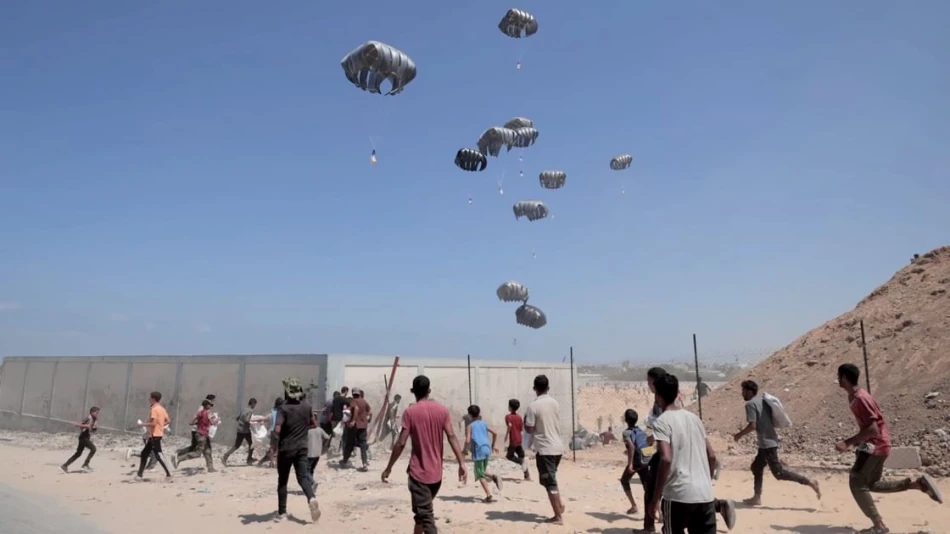
UAE Airdrops 78th Humanitarian Aid Shipment for Gaza as 'Birds of Goodness' Mission Continues
UAE Completes 78th Gaza Airdrop as Humanitarian Crisis Deepens
The United Arab Emirates has delivered its 78th humanitarian airdrop to Gaza as part of Operation "Birds of Goodness," bringing total aid deliveries to over 4,044 tons since the campaign began. The latest mission, conducted in partnership with Jordan, Germany, the Netherlands, and France, underscores the Gulf nation's expanding role as a regional humanitarian leader while highlighting the persistent challenges of delivering aid to the besieged territory.
International Coalition Expands UAE-Led Relief Efforts
The latest airdrop operation demonstrates how the UAE has successfully mobilized a diverse international coalition for Gaza relief. The participation of European nations alongside regional partners Jordan reflects a pragmatic approach to humanitarian diplomacy that transcends traditional geopolitical alignments.
This multi-national coordination represents a significant shift from earlier phases of the Gaza crisis, when aid delivery was primarily handled through established UN channels. The UAE's ability to organize direct airdrops with European backing suggests growing international recognition of Gulf states as credible humanitarian actors.
Scale and Strategic Significance of Aid Operations
The 4,044-ton milestone places the UAE's Gaza relief effort among the most substantial humanitarian operations in the region. For context, this volume exceeds the typical monthly food aid distributed by the World Food Programme in similar crisis zones, making it a logistically complex undertaking that requires sustained coordination across multiple air forces and supply chains.
Operational Challenges and Innovation
Airdrops remain one of the most challenging methods of humanitarian delivery, with success rates typically lower than ground-based distribution. The UAE's sustained execution of 78 consecutive operations suggests significant investment in precision delivery systems and coordination protocols that could serve as a model for future crisis responses.
Regional Implications for Gulf Diplomacy
The UAE's prominent humanitarian role in Gaza reflects broader strategic shifts in Middle Eastern diplomacy. Unlike previous decades when humanitarian aid was primarily channeled through traditional Arab League mechanisms, the UAE's direct action approach signals the Gulf states' growing confidence in independent regional leadership.
This initiative also demonstrates how humanitarian assistance has become a key tool of soft power projection for Gulf nations, similar to how Qatar leveraged aid delivery during regional crises and Saudi Arabia has used humanitarian diplomacy in Yemen and beyond.
Sustainability Questions Amid Prolonged Crisis
While the UAE's commitment appears steadfast, the need for 78 separate airdrops highlights the fundamental challenge facing Gaza's humanitarian situation: the gap between emergency aid and sustainable solutions. Each airdrop, while providing immediate relief, underscores the limitations of external assistance in addressing systemic issues affecting Gaza's 2.3 million residents.
The involvement of Emirati charitable organizations in funding these operations also reflects the UAE's model of combining state resources with private philanthropy, a approach that has proven effective in previous humanitarian crises but raises questions about long-term sustainability as donor fatigue potentially sets in.
Broader Impact on International Aid Architecture
The UAE's Gaza operations may signal a shift toward more agile, state-led humanitarian responses that complement but operate independently of traditional multilateral aid systems. This approach offers faster deployment and fewer bureaucratic constraints, but also raises questions about coordination with established humanitarian frameworks and long-term strategic planning.
As regional powers increasingly take direct action in humanitarian crises, the UAE's Gaza operations could serve as a template for future emergency responses, particularly in situations where traditional diplomatic channels face constraints.
Most Viewed News

 Sara Khaled
Sara Khaled






